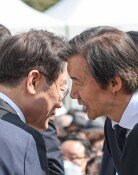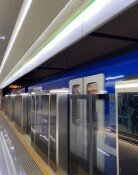Why protest the nuclear summit?
Seoul will host the second Nuclear Security Summit on March 26-67, with the heads of 50 states and four major international organizations to attend. The main agenda will be cooperative measures to combat the threat of nuclear terrorism, protection of nuclear materials and related facilities, and prevention of illicit trafficking of nuclear materials. Following a successful Seoul G-20 summit in 2010, the nuclear summit shows just how Korea`s global status has been elevated.
Having launched an anti-nuclear security coalition Wednesday, some 40 left-wing groups and political parties will hold protest activity, including international forums, news conferences and rallies, March 19-27. In a statement for reporters, they said, "The U.S.-led anti-nuclear movement aims for North Korea and Iran and is engaged in legal disputes while raising military tensions in Northeast Asia and Middle East." These left-wing groups say existing nuclear weapons and nuclear power plants should be abolished before discussing the prevention of nuclear weapon proliferation, but they have anti-U.S. and pro-North Korea sentiments. Many of them have led anti-U.S. rallies, including protests against the resumption of U.S. beef imports in 2008. Kang Jeong-ku, a former professor at Dongkuk University in Seoul, is also one of the groups` members. Arrested in 2001 on the charge of violating the National Security Law when he visited Mankyongdae, the birthplace of North Korea`s founding leader Kim Il Sung in Pyongyang, he wrote a controversial message saying, "Let`s achieve the great task of national unification by cherishing the spirit of Mankyongdae."
The nuclear summit was created at the request of U.S. President Barack Obama in 2009. In response to the rising risks of nuclear terrorism following the 2001 terrorist attacks on the U.S., he proposed the idea to strengthen safety measures and international cooperation against the use of nuclear materials and facilities by terrorists. The second such summit will also discuss nuclear energy safety in the wake of the damage from the Fukushima nuclear meltdown in March last year. The hosting of the summit itself merits no protest since it is for the sake of safe use and management of nuclear weapons.
The main opposition Democratic United Party is aligning itself with left-oriented civic groups protesting the summit. Part lawmaker Lim Jong-suk, who is also the summit`s secretary general, has joined the groups` protest activities but has made vague remarks, saying, "I have no intention to interfere with the summit itself as a member of a responsible party." His comments resemble a change of words to renegotiation of the free trade deal with the U.S. when it faced setbacks. The main opposition party seems to be in an alliance trap ahead of the general and presidential elections. It is apparently opposing all meetings and negotiations with the U.S. for the sake of the alliance.







